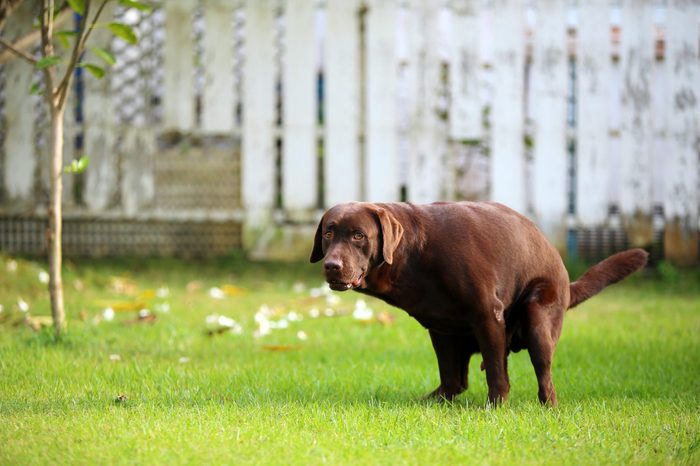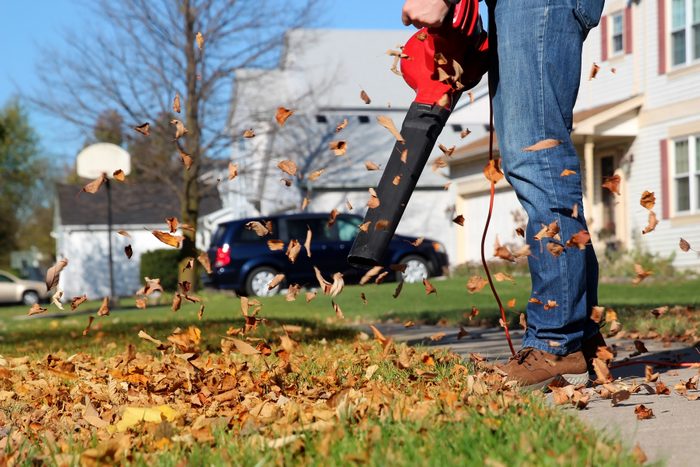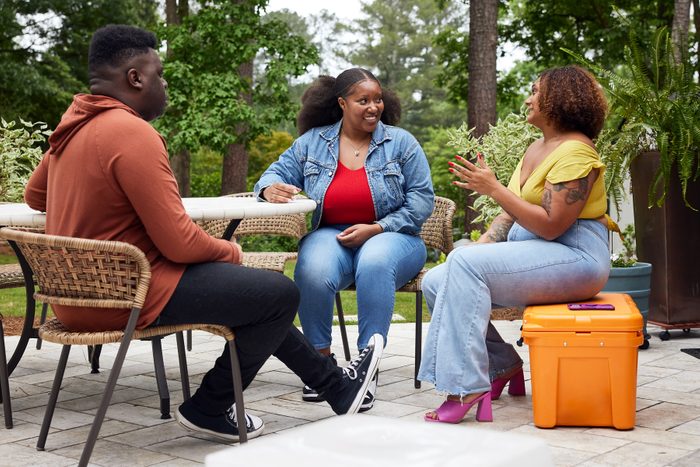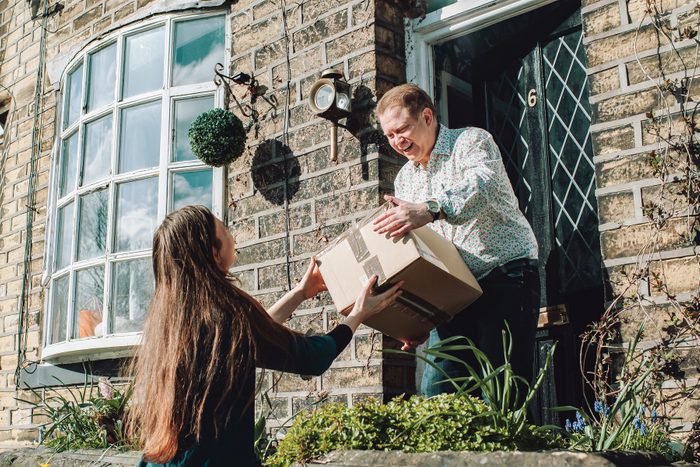Rude neighbors are a fact of life, but our etiquette experts explain how to deal with them in a peaceful way—and how to avoid being a bad neighbor yourself

15 Rude Habits That Make You a Bad Neighbor


Complaining about your neighbors on social media
The Nextdoor app and Facebook are ground zero for most neighborhood conflicts. While social media can be a great tool in uniting local communities, it can also be the source of a lot of rudeness. We all get annoyed by things our neighbors do, but good neighbors follow this social media etiquette rule: Be kind online.
If your first instinct is to post about the problem on the internet—whether you use their name or not—then you’re the bad neighbor, says Diane Gottsman, a national etiquette expert, author of Modern Etiquette for a Better Life and founder of the Protocol School of Texas. “This is very passive-aggressive. Don’t hide behind a keyboard,” she says. “It’s much better to try and resolve the situation in person first.”
What to do instead: “Never say anything online that you wouldn’t say to someone’s face, and don’t use anonymity as an excuse to be rude,” says Goss. “Speaking in person or on the phone should always be the first step in resolving a conflict.” If speaking calmly in person doesn’t resolve the issue, you can consider escalating it to your homeowners association (HOA), if you have one, or to the authorities if there is a legal concern.

Aggressively recruiting your neighbors for your business
Neighborhood get-togethers are a fun way to get to know the people who live near you. And good neighbors want to support one another by patronizing local businesses and encouraging entrepreneurial friends. Unfortunately, some companies take advantage of this by using it as their business model, encouraging people to solicit their friends and neighbors, asking them to not just buy their wares (think essential oils, makeup, clothing, candles and cooking products) but also become part of their sales “team.”
“These types of multi-level marketing businesses are very self-serving; your neighbors are not there to be your source of income,” Gottsman says.
What to do instead: “You can ask if they’re interested once,” she says. “To keep pursuing the matter after they’ve said no is rude.” And don’t ever trick people into a sales party by making it seem like a girls night out or a spa day and then surprising them with a sales pitch.

Pirating your neighbors’ Wi-Fi
When you pull up the list of possible internet connections, you will likely see all of your neighbors’ networks as well as your own. (In fact, some people use this visibility as a way to fight with each other by changing the name of their Wi-Fi.) Modern technology brings modern problems, and pirating someone else’s internet service is the new version of using your neighbor’s water hose to water your lawn. (Don’t do that either.)
Some people still don’t password-protect their networks. Others do, but you may have the password or be able to guess it. Either way, don’t use their Wi-Fi without permission. “It may seem harmless, but your neighbor is paying for that service, the equipment and the electricity,” Gottsman says. “Not only are you slowing down the service they are paying for, but you’re stealing.”
This can also create a security issue, allowing them to steal your personal information if it goes over their network. So avoiding this rude habit is as much for your sake as theirs, she adds.
What to do instead: Pay for your own Wi-Fi. If you’re visiting a neighbor and you’ll be there for a while, it’s fine to ask to jump on their Wi-Fi—especially if you have bad cell service in that spot. Just make sure you’re reconnecting to your network once you’re home, Goss says.

Posting pictures of other people’s children
Living in this digital age, there’s a compulsion to share every bit of life with our online community, from the cute to the contentious and everything in between. But whether you’re posting a fun picture of kids running through the sprinklers at the neighborhood park or calling out teens for riding their bikes over your lawn, it’s rude to post pictures of other people’s children to the internet, Gottsman says. That’s just netiquette 101. Parents have different levels of comfort when it comes to privacy, and unless you have explicit permission to post a picture of their kids, you need to err on the side of safety and refrain, she explains.
Also, be mindful of the comments you make on all pictures your neighbors post—especially those of children. Don’t say anything creepy, judgemental or that could be taken in a bad way (even if that’s not how you meant it).
What to do instead: Always ask permission before posting pictures of other people’s children online, Gottsman says, adding that if you have a problem with someone else’s kids, talk to their parents in person.

Ignoring your neighbor when passing on the sidewalk
In an age when most of us are more consumed by what’s on our phones than what’s in front of us in the real world, we’re seeing an epidemic of people ignoring others in public. (And in private, but that’s a different phone etiquette article!) But while it’s one thing to avoid a stranger’s gaze when walking through a city, it’s an entirely different thing to ignore your neighbor as you pass each other while walking your dogs. Bonnie Tsai, founder and director of Beyond Etiquette, puts it plainly: It’s rude to not acknowledge your neighbor. “This makes you seem arrogant or uncaring,” she explains.
But there’s more to this faux pas than finding yourself on a list of rude neighbors. “You’re missing vital opportunities to connect with those who are closest to you in proximity,” Goss says. “Neighbors are the foundation of your community, and it’s important to, at the very least, be on polite terms with them.”
What to do instead: Even if you’re an introvert, it doesn’t take much to acknowledge your neighbor with a polite nod and smile, a wave or an exchange of a few brief pleasantries.

Letting your dog poop on your neighbor’s lawn and not picking it up
If there is a neighbor “sin” that really riles people, it’s this rude dog-owner habit. “Not only is it rude, but it’s gross,” says Erin Askeland, a certified pet behavior expert at Camp Bow Wow. “Dog excrement can transmit diseases, damage plants and grass, and, let’s be honest, doesn’t have the most pleasant smell.”
Do this instead: Bring poop bags with you every time you take your dog out—and use them. “It’s your responsibility as a pet owner to clean up after them,” she says. It’s the polite thing to do regardless of whether your dog poops on the neighbor’s lawn or in a neighborhood area, like a park or green space. Dispose of the bags of poop by putting them in public trash cans or your own at home. But don’t put them in a neighbor’s trash.

Asking to borrow your neighbor’s lawn mower
It used to be that people were welcome to ask their neighbors to borrow anything from a cup of sugar to small equipment. However, the norms have changed, Gottsman says. “These days, people are much more isolated from one another, and these requests are often seen as a rude intrusion,” she explains. “Unless you know your neighbor very well and already have a friendly relationship, don’t ask to borrow things.”
This is especially true for expensive items like tools and machinery, Goss adds.
Do this instead: Start by building trust with your neighbors and establishing a friendly relationship before asking to borrow things. If you do borrow the lawn mower, offer to fill up the tank so you’re making an effort to repay the favor. And it goes without saying that if you ask to borrow things, you should be ready to lend your things or help when asked.

Reporting your neighbor to the HOA for leaving their garbage cans out
My husband is on the board of our neighborhood homeowners association, and he is constantly astonished by how many neighbors try to weaponize the HOA to resolve petty personal disputes or to make ridiculous reports. Whether you think your neighbor’s lawn is overgrown, their kids are too loud or their cars are an eyesore, reporting people to the HOA should be seen as a last resort and reserved for things that legitimately cause a problem for the neighborhood, Gottsman says.
HOA violations often come with fines—and a lot of bad blood. “This is how small issues get blown out of proportion and start a war,” she adds.
Do this instead: “This really boils down to: Mind your own business and don’t be petty,” Goss says. Little things—like watering at the wrong time of day, leaving garbage cans out overnight or having a messy front yard—should be politely ignored or handled with a calm conversation in person, Goss says. If you do feel like something rises to the level of the HOA, make your complaint succinctly and with evidence to back it up. Do not use the HOA to settle personal conflicts with your neighbors.

Letting your stuff spill over into your neighbor’s yard
Many homes have shared spaces or are very close to their neighbors. It’s so easy to let your outdoor things spill out of your yard and into your neighbors’ spaces, especially if you have kids or pets. But even though their lawn may be right outside your door, it doesn’t give you permission to use it. “It’s rude not to respect your neighbor’s boundaries, physical or otherwise,” Tsai says. This includes driveways, side yards and shared structures like fences as well.
Speaking of fences, if you don’t have one, consider building one to keep your stuff contained. These encroachments, even small ones, can build resentment over time. “This is where the phrase ‘good fences make good neighbors’ really applies,” Goss adds.
Do this instead: Be sure to keep your yard clean and avoid letting your stuff drift onto your neighbors’ property. That’s good etiquette whether you have a fence or not.

Blowing leaves onto your neighbor’s lawn at 7 a.m.
Keeping your stuff in your yard applies even if it’s “natural” stuff, like leaves, grass clippings or snow. “Obviously, if the wind is blowing leaves into your neighbor’s yard, there’s nothing you can do about that,” Goss says. “But there’s a big difference between that and deliberately aiming your leaf blower in their direction.” If you’re creating more work for them, you’re being a bad neighbor.
Another factor in yard maintenance is the time of day you do it. Leaf blowing at 10 a.m. on a Saturday is fine. The same activity at 7 a.m. makes you a rude neighbor, she says.
Do this instead: Bag up your yard waste in compostable bags and compost it at home or dispose of it properly. Many cities have recycling programs exactly for this purpose and will send out notifications in the fall when many people are winterizing their yards.
“Don’t use noisy yard equipment at any time people would be expected to be sleeping,” Goss says. To be safe, keep your lawn mowing and leaf blowing between 9 a.m. and 9 p.m. And consider starting even later in the morning if you know your neighbor works the night shift and needs to sleep late in the morning.

Making race-related complains
If you have spent any time on neighborhood apps, then you know that complaining about a neighbor’s food smells is a shockingly common occurrence. Sometimes, vegans will complain about the odor of cooked meat, but more often, the gripes are thinly veiled racism. Complaining about “stinky” foods you don’t recognize and (think) you don’t like is rude, Goss says.
There are other microaggressions that can make people of other races feel uncomfortable in your neighborhood: complaining about home decorations, flags, music or clothing that represents a different culture, for instance. While it’s normal to have a negative first reaction to things that feel different from the norm, you can and should fight that instinct, she says.
Do this instead: “Instead of getting worked up about something that is out of your comfort zone, make an effort to get to know that neighbor,” Goss says. “Ask them about their food, their culture. Invite them over for dinner and try their dishes.”

Gossiping
If neighbors didn’t gossip or judge one another, the entire Real Housewives reality TV franchise wouldn’t exist. But just because it’s human nature doesn’t make it less rude.
From tattoos and bathing suits to religion, politics and tawdry affairs, there’s an endless supply of things you can potentially judge your neighbors for and talk about with others. “Gossip is one of the most toxic and rude things you can do,” Goss says. “These rumors, whether they are true or not, can cause a lot of hurt and pain.” And in a small area like a neighborhood, gossip can have life-altering consequences.
Do this instead: “The old adage is true: Don’t say anything behind someone’s back that you wouldn’t say to their face,” she says. And stop jumping to conclusions. One of the nicest gifts you can give your neighbors is the benefit of the doubt; don’t make assumptions about them. “Treat everyone with respect and kindness, no matter what,” Tsai adds.

Giving your neighbor unsolicited advice
Whether you think their parenting style is too lax and they’re raising future criminals or their lawn is too brown and needs different fertilizer, keep your opinions to yourself. Giving your neighbor advice without being asked is a rude conversation habit, Tsai says. Everyone knows that guy who can’t stop telling everyone else what to do—and everyone avoids him. Don’t be that guy.
Do this instead: “You should be listening more than you speak,” says Tsai. Ask questions, and be curious about why they do what they do. And if they do ask for your opinion, then feel free to give it to them in a kind, polite way.

Saying yes to every favor asked of you
At first glance, this may seem the opposite of rude—after all, you’re being super helpful and kind, right? But becoming the default neighborhood watchdog, babysitter, package picker-upper and bus stop monitor will take a toll. “Saying yes to everything your neighbors ask you to do may feel great at the moment, but it could end up negatively impacting your relationship due to resentment and exhaustion,” Tsai says. It’s also futile: Even the best people pleaser can’t please everyone.
Do this instead: Like fences that provide physical boundaries, good emotional boundaries make good neighbors, Goss says. Define what you have the time, energy and resources to really do and then do those things well. Don’t feel bad about turning down other things.

Not RSVP’ing to invitations
If your neighbors are kind enough to invite you to their barbecue, child’s birthday party, dinner party, wine tasting, wedding or other event, then you owe them a prompt answer. Unfortunately, it’s become very common today for people to either not RSVP at all or to hold back on responding, waiting to see who else is coming first—and that’s rude, Goss says. “Hosts need to have an accurate head count so they know how much food, drinks and other things to plan,” she says.
Do this instead: Reply as soon as you know whether you can make it—if possible, within 24 hours. If you’re late, still send in that RSVP card, but also offer an apology, Goss says. The upside to being neighbors is that you can always give them a verbal RSVP in person.

How to deal with rude neighbors
The Battle of the Bees was not the first (nor the last) neighborhood conflict I’ve been caught up in, and that’s likely true for you as well. So if you’re dealing with one of the issues above or some other hurtful behavior from rude neighbors, you might be wondering how to navigate this tricky issue. You want to do your best to defuse the situation without going to DEFCON 1 right away—after all, you have to live next to these people for years—but you also shouldn’t be a pushover, Goss says.
Here are pro tips for how to deal with rude neighbors, including etiquette tips that good neighbors follow:
- Talk to them in person. “Rude neighbors are often misunderstood neighbors,” Goss says. “A face-to-face conversation can clear up an amazing amount of disagreements.” Ask questions and listen.
- Send a text or email. If talking doesn’t resolve the problem or you’re unable to talk to them in person, send them a text or email. This will also provide a written record of the dispute in case it escalates further. Save or screenshot any interactions, along with the date they happened.
- Ask for a mediator. If you have a common neighbor or friend, it may be helpful in some situations to sit down as a group and talk through the issue. Keep in mind that this can often lead to more conflict if the third person is not able to be impartial. You have the option of hiring a professional mediator who can meet with both of you and help you draft an agreement.
- Talk to the HOA. For serious conflicts directly related to the neighborhood, you can escalate your complaint to the HOA board. They may make a decision or set up a hearing where you can both make your case.
- Call the police. If things get violent or you’re worried about your safety, call the police rather than engage in a potentially dangerous confrontation. Keep all records of any police interactions, even those where a citation wasn’t issued.
- Talk to a lawyer. Look for a professional who specializes in the type of dispute you’re having.
In the end, the Battle of the Bees was resolved at Step 4. The HOA stepped in and ruled that bees are “livestock” and therefore not allowed to be kept by individual homeowners. The beekeeper found a place in the country to relocate his hives where he could still work them. The children all remained unharmed. And to everyone’s credit, once the decision was made, people seemed to really calm down. Both families were indeed in attendance at the next neighborhood barbecue.
About the experts
|
Why trust us
Reader’s Digest has published hundreds of etiquette stories that help readers navigate communication in a changing world. We regularly cover topics such as the best messages to send for any occasion, polite habits that aren’t as polite as they seem, email and texting etiquette, business etiquette, tipping etiquette, travel etiquette and more. We’re committed to producing high-quality content by writers with expertise and experience in their field in consultation with relevant, qualified experts. We rely on reputable primary sources, including government and professional organizations and academic institutions as well as our writers’ personal experiences where appropriate. For this piece on rude neighbors, Charlotte Hilton Andersen tapped her experience as a longtime journalist who specializes in etiquette and communication for Reader’s Digest. Then Laura Windsor, a U.K.-based etiquette expert who was trained by a member of Queen Elizabeth II’s household and now advises international royals, celebrities and regular people, gave it a rigorous review to ensure that all information is accurate and offers the best possible advice to readers. Read more about our team, our contributors and our editorial policies.
Sources:
- Diane Gottsman, MS, national etiquette expert, author of Modern Etiquette for a Better Life and founder of the Protocol School of Texas; phone interview, July 25, 2024
- Jan Goss, etiquette expert, founder of Show Up Well consulting and author of Protocol Power; phone interview, Aug. 15, 2024
- Bonnie Tsai, founder and director of Beyond Etiquette; interview, September 2019
- Erin Askeland, certified pet behavior expert at Camp Bow Wow





















